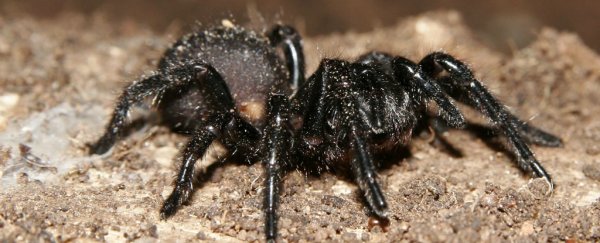Honey bees have it really bad right now. A recent report found that 44.1 percent of all honeybee colonies in the US died off last year, and there's been an annual loss of 30 to 90 percent of hives around the world over the past few years. While many factors contribute to this decline, one of the biggest causes is thought to be the use of chemical pesticides that contain neonicotinoids - a substance known to cause Colony Collapse Disorder (CCD).
Since honeybees pollinate roughly 80 percent of flowering crops, their survival is directly connected to ours. So, to curb this rapid decline, researchers have turned to an unlikely source to create honeybee-safe pesticides: the Australian funnel-web spider, one of most deadly spiders in the world.
You heard that right, the key to saving the honeybee could lie with a venomous spider from Australia, but how does it work?
Well, the exact formula hasn't been made public, but, according to Vestaron Corp., the Michigan-based startup behind the new pesticide, it's possible to extract specific peptides from the deadly spider's venom that actively kill harmful pests without affecting mammals or beneficial critters that actually help your garden thrive, like honeybees.
This is possible because spider venom contains millions of different peptide toxins that can target certain pathways inside certain animals. The team was able to figure out which peptides affect certain pests, and isolated those out.
As the team reports on their site:
"Instead of fighting crop pests with harmful chemicals, our technology's insect resistance derives from spider venom, which safely and effectively targets new metabolic pathways of pests. This venom is harmless to mammals (including humans), birds, fish, honeybees, and other beneficial insects."
One of the coolest things about the new pesticide, other than its honeybee-saving powers, is that the team only needed one sample of the venom, which they bought from an Australian firm that milks the spiders. Using this sample of real venom, they were able to isolate the specific peptide, then create a fermentation process in the lab that allows them to make a synthetic version, reports Matt Hickman for Mother Nature Network.
So no, there won't be hellish farms of funnel-web spiders getting milked for insecticides any time soon.
"We selected those that don't have any mammalian effects, and we isolated those components, synthesised the genes for them, put them into yeast, and by fermentation, that produces our product for us," Vestaron's chief executive John Sorenson explained to Michigan Radio. "So it's a slick way to have to get around having to milk spiders."
The USDA has recently approved the venomous pesticide for sale, which means it could hit stores or online retailers soon, though no date has been confirmed.
Only time will tell if the honeybees will rebound with decreased use of chemical pesticides, but at this point, it's definitely worth a shot.
